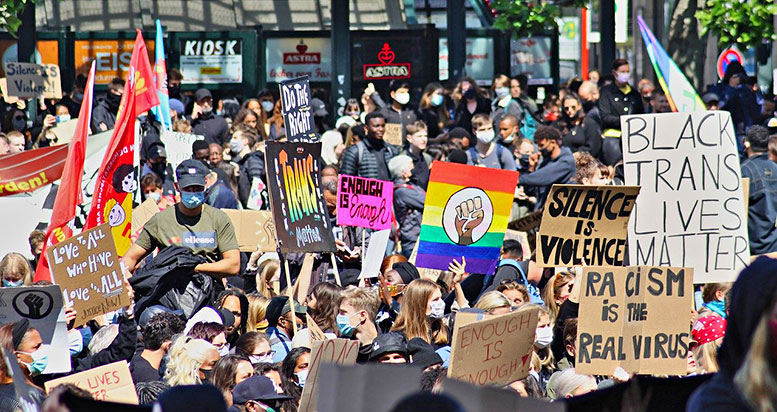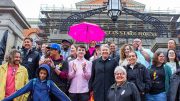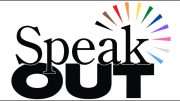Boston Pride 4 the People Forms; Composed of 21 Committee Chairs, co-chairs & volunteers Who Resigned After Ongoing Allegations Of Racism And Transphobia From The BP Board
By: Audrey Cole/Reporter/TRT Reporter—
BOSTON—Boston Pride 4 the People, an organization formed by resigned committee chairs and volunteers of Boston Pride (BP), recently launched a campaign to demand BP’s board of directors step down citing a long history of allegations of racism and transphobia stemming from the board leadership, its co-founder said.
“[Boston Pride 4 the People] is an organization founded by the volunteer workforce of Pride and community leaders who have lost trust in the current members of the Pride board to adequately serve the LGBTQ+ community, especially the trans and LGBTQ+ community of color,” said Jo Triglio (they/them), a resigned member of the Boston Pride Communications team and co-founder of Boston Pride for the People, who was also selected as the Boston Pride Grand Marshal in 2018.
According to Triglio, Boston Pride is missing the mark in addressing the needs of the most vulnerable within the LGBTQ+ community and they believe Boston Pride must and can do better to represent the community it serves.
“[We] want to preserve Pride, but refocus back on the community,” they said. “We want to address issues that affect our community—racism, white privilege, transphobia, etc. The purpose of Boston Pride 4 the People is to bring Pride back to the people.”
For a number of years, Boston Pride has come under fire for a lack of diversity and inclusion, prompting actions and branches of movements to manifest due to the exclusion of LGBTQ+ community members.
“Boston Pride has a duty and responsibility to address the needs, concerns, and interests of its entire community,” said Triglio, who also served on the Dyke March Organizing Committee. “Boston Pride should be robustly inclusive. It has a long history of failure on this measure.
“In addition to being white-centered, Boston Pride was deeply male-centered and sexist in the ’80s and early ’90s. The Boston Dyke March was founded in response to Boston Pride’s perpetual failure to address issues of gender oppression. The Trans Resistance March that took place a few weeks ago is yet another example. If Boston Pride were serving its community adequately, we would not need to start separate organizations or have separate marches.”
Henry Paquin, (one of 21 people who stepped down resigned Entertainment Chair for Boston Pride, spoke pointedly of what is needed and what Boston Pride 4 the People ultimately seeks.
“We are looking to improve Boston Pride by changing the failed leadership of the board,” he said. “We need board members who will listen to the voices of their own community and respond to their needs.”
Black & Latinx Pride tossed to the side
According to Boston Pride 4 the People, Boston Pride has failed throughout the years addressing the needs and concerns of the Black and Latinx communities, specifically, including defunding Black and Latinx Pride programming.
“Boston Black and Latinx Pride were underfunded when I began volunteering in 2016,” said Casey Dooley, resigned Chair for Black Pride, an arm to Boston Pride. “When I became Chair in 2017, I wanted to work in collaboration with established LGBTQ+ organizations of color. I wanted to work in partnership with them and support their events. But the board put so many obstacles in place … It was a constant struggle. There are no written policies for partnerships or for providing financial support to other organizations. And the rules keep changing. The process keeps changing. The board can say yes or no to any idea without needing to explain.”
The current Boston Pride board does not prioritize the needs of marginalized communities, Dooley noted.
“The bottom line is that the board is not interested in centering the issues and concerns of Black and Latinx Pride,” Dooley said. “They [Black and Latinx Pride] are underfunded and neglected because they are not priorities for this board.”
Poor leadership
As for Triglio, the disregard for communities of color is ultimately the cause of poor leadership and an inability to break down the barriers of structural racism.
“What has happened to Black and Latinx Pride is indicative of the poor relationship the Pride Board has had [with] the LGBTQ+ community of color in Boston,” they said. “Most people of color are not interested in volunteering their time and energy for an organization that is structurally white-centered.
“It takes only one or two meetings for a person of color to see that the Pride board does not center issues of racial justice, to experience or witness racist microaggressions, and to see that there is no critical mass of people of color to enact change from within. Failing the Black and Latinx communities for so long is a clear failure of leadership.”
Paquin agrees and believes that diversity in leadership roles is key.
“The lack of diversity throughout the Pride organization indicates the inability of Boston Pride to address issues of racism and white privilege,” he said. “Until we have a more diverse board and an organizational structure that welcomes community input, the Black and Latinx communities will continue to be an afterthought of the board of Boston Pride.”
Corporations, not community
According to Triglio, Boston Pride has lost focus on representing the people and instead caters to corporations, a contentious topic for a number of years, and one that has drawn protests and political action against the organization. A change in leadership could change that, Triglio said.
“People want a community Pride, not a corporate Pride,” they said. “Prides have two purposes, to celebrate LGBTQ+ culture and community, and to increase awareness and participation in issues of social justice, especially those that affect the most disadvantaged among us. In this historical moment, it is essential that Boston Pride center and amplify the voices of trans, indigenous, and people of color. It’s time for new leadership. We want an organization full of diverse voices.”
Resignations & external consulting group
Prior to the resignation of a substantial portion of volunteers and those chairing committees within Boston Pride, its members offered insight and guidance to the organization to make it stronger, Dooley said.
“We suggested allowing the community to select a mediator to open a dialogue between the Pride board and the community leaders and Pride volunteers,” she said. “You can’t rebuild trust without talking to your workforce and the community you are supposed to serve. Instead, the Boston Pride board hired a consultant that does not live in MA and is not part of our community. This is what you do when you want to preserve your power. It’s another example of the board ignoring the voices of its own workforce and community members.”
According to a press release disseminated by Boston Pride, the consultant hired is Dorrington & Saunders, LLC, an agency that “specializes in transforming organizations to honor and operationalize their social justice missions from theory to application to practice.”
Boston Pride president Linda DeMarco vowed institutional change, the release read.*
“We have heard the voices from our community and we know that Boston Pride must take more substantive steps towards becoming more diverse throughout our organization, including in our leadership,” she said via the press release. “It is important for the community to know that Boston Pride supports the Black Lives Matter movement and the efforts to end systemic racism and police brutality against Black and Brown people including the LGBTQ+ community. The experience and commitment to the LGBTQ+ community that both La Verne Saunders and Judah Dorrington bring will help us fulfill the mission of Boston Pride to represent the full spectrum of the diverse community that we serve and to address structural racism and police violence in the region.”
A Legacy of Promises
Throughout the years, Boston Pride has backtracked statements and actions, relating to race, ethnicity, and trans status while “promising to do better,” similarly to when the parade was halted for 11 minutes in 2015 a protest to highlight trans and racial inequities within the organization.
“Black Lives Matter made their ten demands of Boston Pride in 2015, and the Pride board ignored them,” Dooley explained. “And they have ignored them every year since then. There is no evidence that the board listens to the voices of the community. They just keep doing whatever they want, regardless of what the community keeps saying.”
According to Triglio, the final straw prompting the formation of Boston Pride 4 the People was the ongoing erasure of Black lives by the Boston Pride Board in a unilateral decision to remove any reference of Black Lives Matter in the official statement on police brutality after the murder of George Floyd, Breonna Taylor and Tony McDade.
“The current board of Boston Pride removed ‘#BlackLivesMatter’ from a statement condemning unjust, racist police violence,” they said. “The board members discussed it, removed it, approved the statement, and posted it. It was not an accident, mistake, or oversight. It was purposeful. Everyone should ask them why.”
In response to community outcry of the erasure of #BlackLivesMatter, the board’s subsequent reaction heightened the response.
“The community, rightfully, responded with anger and disgust,” added Triglio. “The communications team and the volunteer workforce demanded an explanation from the current members of the Pride Board. Instead of explaining, the board retreated to its bunker for two weeks. Instead of starting an interactive dialogue with its own volunteer workforce and community members, the board hired a consultant from New Jersey to help protect their power. If they were serious about ‘doing better’ and ‘transforming,’ they would have done what they always fail to do, engage in dialogue with the community that is unhappy with them.”
Dooley said such actions speak for the current state of Boston Pride leadership.
“ … In 2020, instead of finally supporting BLM [Black Lives Matter], they remove #BlackLivesMatter from an anti-police violence statement. There has been no change [in the organization].”
Paquin expressed his concerns about the intent behind Boston Pride’s actions.
“I personally do not feel proud to volunteer for an organization that clearly has an issue with saying #BlackLivesMatter,” he said. “They [the board] will tell you it was an oversight, but don’t let them fool you, they removed [it] with intention.”
Boston Pride vowed to do better, according to an original statement on the organization’s website, which was later revised.*
“We promise to do better at listening to our community and pledge our commitment to support and work in collaboration with organizations that serve communities of color and address racism, to ensure that our organization, programs, and events prioritize their needs and concerns,” the statement read. “We hear our community and are committed to transforming Boston Pride to serve every facet of that community better.”
“Enough is enough”
However, Triglio says that is not enough. When given the opportunity to work within their organization to give Black and Latinx voices amplification, they refuse to listen and seek outside assistance they said.
“Every time the community calls out Boston Pride for yet another racist, sexist, transphobic, or white-centered incident, the board says it will do better, then retreats to its bunker and waits for the firestorm to die,” they said. “When the coast is clear, they resume their regularly scheduled program without making the necessary substantive changes.”
Paquin, a longtime member of Boston Pride speaking to the organization’s lack of inclusive leadership, noted that this is business as usual.
“This is how Boston Pride’s handles community outcry on the tough issues of race and inclusion—they promise to do better,” he said. “Time after time, these ‘promises to do better’ are never fulfilled. Enough is Enough. The current board doesn’t have the capacity to address issues of racism.”
The open letter produced by Boston Pride 4 the People, asking the 6 board members of Boston Pride to resign, has been met with resistance, according to Triglio. However, they say that the smoke will not clear this time.
“The statement asking the board to resign was signed by all of the chairs/leaders of the volunteer workforce, members of the communications team, and LGBTQ+ community leaders of color,” Trilgio said. “This means that the people who do the bulk of work for Pride no longer trust the board. And, they are standing in solidarity with the QTPOC community who has been pressing for change for years. Their refusal to resign is a perfect example of their inability to hear the voices of others. The community is speaking loudly, and they can’t hear. They are busy trying to protect their power.”
In what allegedly is a power grab, Triglio said that Boston Pride hired the consulting agency to “help them protect their power.”
However, according to DeMarco*, the consulting firm will be an effective solution to address inclusion within the organization.
“The experience and commitment to the LGBTQ+ community that both La Verne Saunders and Judah Dorrington bring will help us fulfill the mission of Boston Pride to represent the full spectrum of the diverse community that we serve and to address structural racism and police violence in the region.”
Triglio sees it differently.
“If this were not a publicity stunt, they would have immediately opened up lines of communication with their own volunteers, and with the LGBTQ+ community leaders of color who expressed unhappiness with their leadership,” they said.
During their work with Boston Pride, Triglio said that recommendations to meet the needs of communities of color have been met with resistance and defensiveness.
“During 2017-18, Sasha Goodfriend and I went on a listening tour, meeting with a number of LGBTQ+ community organizations and members who were unhappy with [Boston] Pride, including BLM [Black Lives Matter],” explained Triglio. “We wrote a report that we presented to the Pride Board. They responded by being defensive.”
Triglio recognized the need to educate the board from within the organization but it fell on deaf ears, especially relating to the struggles of people of color and the current state of affairs.
“Last year, I enlisted two colleagues to form a Pride communications team, hoping that we could begin educating the board from within,” Triglio said. “We had to battle the board to not remove words like ‘oppression’ and ‘racism’ from our external communications. We had to explain intersectionality to the board. Most recently, while everyone was posting statements [relating to BLM and police brutality] all around us, we had to beg for days for permission to write a statement condemning police violence. After all these years of trying, my conclusion is that this board will not listen or change.”
Ultimately, Triglio said that the board has already refused to resign but the demand will not go away any time soon as the organization is being “held hostage.”
“They are up to their old tricks,” Triglio said. “They are promising to do better while they wait for the smoke to clear. But this time, enough is enough. The smoke is not going to clear. The majority of its own volunteer workforce no longer trusts their leadership. The community has had enough of white-centered, apolitical, corporate pride. Pride belongs to the community, not the six people who are holding it hostage.”
“Absolute Power”
According to Triglio, the bylaws of Boston Pride provide exclusive authority to the board of directors and not to any of the committee or volunteer members, giving it unchecked power.
“The bylaws of Boston Pride give the board absolute and exclusive power,” Triglio said. “The volunteer workforce that does the work that makes Pride happen has no power whatsoever. This current board makes all the decisions by itself. It is not accountable to anyone—not its volunteer workforce, not its communications team, not the voices of community leaders and members. They have been practicing non-listening for years. Non-listening is a habit for this board. Habits developed from absolute power are hard to break.”
Not the right people for the job
Currently, an ongoing petition requesting Boston Pride leadership to resign has received nearly 3,500 signatures.
“The petition is still going,” said Triglio. “More and more people sign it every day. It’s just a matter of distribution, not persuasion. The minute people see it, they sign it. I don’t know anyone who has hesitated to sign it.”
Triglio spelled out the bottom line for what they view the Boston Pride board should represent and who it should be composed of, noting that identity is not enough.
“First, it must be said that identity does not equal political awareness and knowledge,” they said. “For example, I know plenty of LGBTQ+ people who are homophobic and lack an understanding of LGBTQ+ political issues. For me, the goal is to have board members who represent a number of identities and have an advanced understanding of intersecting oppressions. Both are necessary. We need board members who know how to hear and respond to the multiple voices of our community.”
According to Paquin, he has pushed back against Boston Pride from within the organization for several years for more diverse and inclusive voices.
“ … Just when you feel like you have made some change for the better, the board makes another crazy statement that sets back the good work of the Volunteers,” Paquin said. “It has become clear that [they] have no plan to ever change and it’s time for the volunteers/Committee members to stand up against a group of people not interested in listening to their own community. We want to engage in community dialogue, we want to address issues of white privilege, racism, and racial justice, and we want change to happen now.”
Although Triglio acknowledges the work of the current board, change is critical to move forward.
“No doubt, the current board members have worked hard devoting many volunteer hours to Pride, but they are not the right people for the job,” they said. “They don’t know how to listen and they are painfully out of touch with current racial justice politics.”
Demands
“We demand all 6 members of the current board resign by August 31st, or otherwise defined by a Transition Committee, following the multi-stage transition plan” outlined in the ‘open letter to the Boston Pride Board. “Our goal is to ensure the continuance of Boston Pride as an institution that serves the LGBTQ+ community for many years to come.”
To learn more about Boston Pride 4 the People, sign the petition or get involved in their efforts, visit www.bp4thepeople.org. Visit Boston Pride at bostonpride.org. To learn more about the alleged past history of racism and transphobia expressed throughout this report, visit https://bit.ly/31UEN28.
*EDITOR’S NOTE: The Rainbow Times’ reporter for this piece, along with myself via phone, reached out to Boston Pride directly and via their PR Firm, O’Neil and Associates, with 10 specific questions relating specifically to this story three times. No questions were answered directly. Instead, two general press releases/statements were provided to the publication via O’Neil & Associates. When pressed for additional information relating to the specific questions for this interview, O’Neil & Associates said that Boston Pride had “no other response.”







